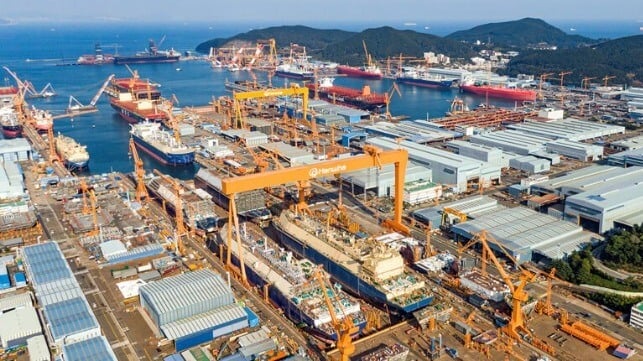Korean Shipbuilders Expect Strong 2025 While Looking to Trump Presidency

South Korea’s shipbuilding industry is projecting another strong year as part of a multi-year supercycle in orders while also looking to the second presidency of Donald Trump to be a boon to the industry. Despite growing competition from Chinese shipbuilders, the Koreans are expressing confidence in part due to their focus on high-value shipbuilding, new technologies, and an increased focus on navy shipbuilding and repair for the U.S. Navy and others.
The expectations for 2024 were reserved with many in the industry forecasting orders would be below 2023 levels. While the Chinese yards have moved to as high as 70 percent of the monthly orders in the year, the Koreans highlight the strength in the LNG carrier sector which they have traditionally dominated. Containerships have also been strong while new segments including ammonia carriers are emerging while they have more or less ceded bulkers and the lowest cost ships to other countries.
The largest group, HD Hyundai, which consists of three yards, reported earlier in November that it has reached nearly 145 percent of its forecast for the year. It has booked 174 ships (including four naval vessels) and one offshore unit worth a total of $19.53 billion to date. Its forecast was for $13.5 billion in new orders.
Hanwha Ocean which emerged from the former Daewoo Shipbuilding & Marine Engineering claims to have achieved the largest orderbook for an individual shipyard in 2024. So far this year, it reports total orders of nearly $7.9 billion for a total of 39 vessels.
Near term, the industry points to the buildout of LNG capacity and demand worldwide expecting that it will continue to drive orders. BusinessKorea reports the industry is forecasting orders of more than $50 billion for 2025 following the expectations that the five major yards (HD Hyundai, Hanwha Ocean, and Samsung Heavy Industries) will end 2024 with orders of more than $40 million after $35 billion in 2023. The report says the forecast projects 88 LNG carrier orders, versus 51 in 2023 and 55 this year. It would be approaching the record of 119 LNG carriers ordered in 2022.
While Clarkson Research has highlighted a potential leveling off of shipbuilding prices, the Koreans are optimistic in part because of the strong support they believe they will get during a Trump presidency. Reports highlight a strong call between the president-elect earlier this month and South Korean President Yoon Suk Yeol.
Both HD Hyundai and Hanwha Ocean had already been taking steps to expand their naval contracting. Earlier this week it was reported HD Hyundai signed a collaboration agreement which will see it develop submarines for the Peruvian Navy. Both companies were also certified in 2024 for U.S. Navy maintenance, repair, and overhaul work signing a Ship Maintenance Relations Agreement (MSRA) with the U.S. military authorities. Hanwha has already won two contracts which are both underway for maintenance and overhauls and both look to expand their bidding in 2025.
Hanwha has been taking steps to expand its relationship with the U.S. Navy and making outreach to the U.S. Congress as it awaits approval to complete the acquisition of Philly Shipyard. It has already publicly discussed its plans for large investments in the yard positioning it for U.S. government work, possibly Navy contracts, or becoming a supplier of components in larger projects.

that matters most
Get the latest maritime news delivered to your inbox daily.
The Korean Herald reports Hanwha Group Chairman Kim Seung-youn has a long-term friendship with the founder of The Heritage Foundation which likely provided Hanwha access to Trump. They note Kim was the only leader of a Korean conglomerate invited to attend the 2017 inaugural of Donald Trump.
The next Trump presidency is expected to take further steps to counter China’s growing influence in the region and key industries including shipbuilding as well as expanding the U.S. Navy and armed forces. While there are some expectations that commercial shipbuilding could enter a downcycle after demand is met for LNG carriers, the Korean shipbuilders are reported to be optimistic in part due to their increased focus on naval shipbuilding.
